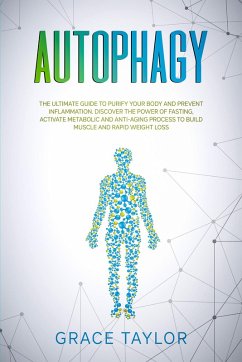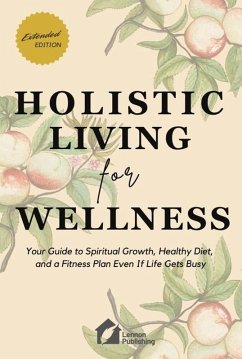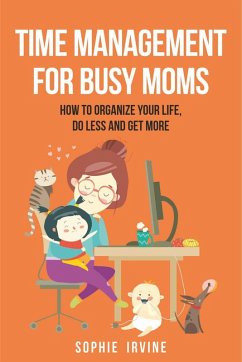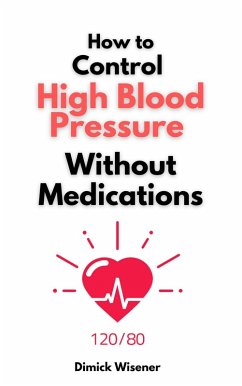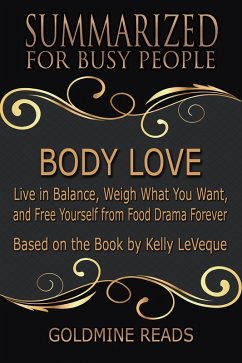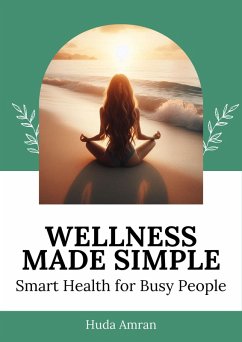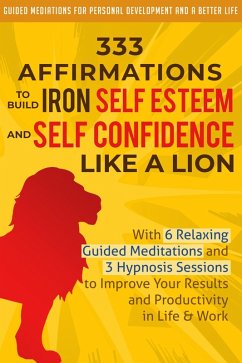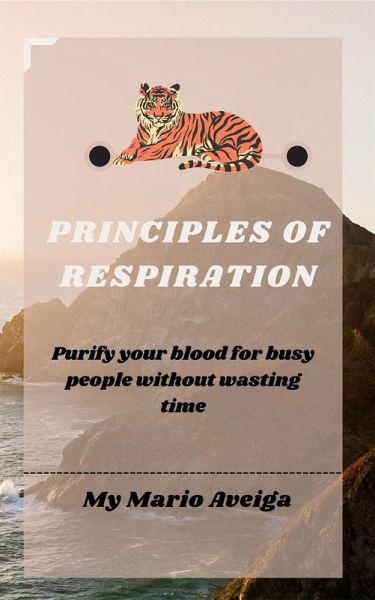
Principles of Respiration & Purify Your Blood for Busy People Without Wasting Time (eBook, ePUB)

PAYBACK Punkte
0 °P sammeln!
IntroductionChapter 01 - A Look at Your Fight or Flight ResponseThe problem with the fight or flight responseChapter 02 - What are neurotransmitters?What is a flow state?How Neurotransmitters WorkChapter 03 - Food and Other Medications to Keep CalmHow we already manipulate our neurotransmittersAnxiolyticsOther substances that affect your neurotransmittersChapter 04 - Managing Panic Attacks and AnxietySymptoms of panic attackWhat is a normal heart rate during a panic attack?Managing anxiety and panic attacks How to combat anxiety and panic attacks by controlling your thoughts andEmotionsThe AWA...
Introduction
Chapter 01 - A Look at Your Fight or Flight Response
The problem with the fight or flight response
Chapter 02 - What are neurotransmitters?
What is a flow state?
How Neurotransmitters Work
Chapter 03 - Food and Other Medications to Keep Calm
How we already manipulate our neurotransmitters
Anxiolytics
Other substances that affect your neurotransmitters
Chapter 04 - Managing Panic Attacks and Anxiety
Symptoms of panic attack
What is a normal heart rate during a panic attack?
Managing anxiety and panic attacks
How to combat anxiety and panic attacks by controlling your thoughts and
Emotions
The AWARE technique for panic attacks
Exposure therapy
Chapter 05 - Cognitive Behavioral Therapy explained
Behaviorism and a brief history of psychology lesson
Introduction to Cognitive Behavioral Therapy
Cognitive behavioral therapy techniques
Consciousness
Recording thoughts
Challenging thinking
Hypothesis testing
How to be socially courageous with hypothesis testing
Chapter 06 - How Can Meditation Help?
Mindfulness meditation
Transcendental meditation
Some tips and suggestions
Chapter 07 - Breathing Techniques and Visualizations
Abdominal breathing
Other Breathing Methods and Visualizations
Chapter 08 - Power Positions, Face Feedback, Priming and Grounding
Power positions
Facial feedback
Priming
Grounding
Chapter 09 - Cognitive Biases - Making Better Decisions
Gambler's fallacy
Risk aversion
Confirmation bias
Functional fixation
Retrospective bias
Contrast effect
Chapter 10: Conclusion
The goal is not to completely eliminate stress or anxiety. This is something that we must make clear from the beginning.
Believe it or not, stress and anxiety are useful emotions. Both put the body in a physiological state of increased arousal, attention and awareness and can even increase physical strength and power. When you are stressed, you are essentially 'on the run' and this makes you better at completing physical tasks or reacting on the spot.
Psychologists have also shown that stress can be a positive motivating force in the right circumstances. Stress is what forces us to study for exams and what motivates us to save money as a contingency fund. Specifically, this type of stress is known as 'eustress' and it is a very useful phenomenon.
The problem is that many of us have no control over when we get stressed or when we have anxiety. This, in turn, leads us to feel those emotions in maladaptive situations.............
Chapter 01 - A Look at Your Fight or Flight Response
The problem with the fight or flight response
Chapter 02 - What are neurotransmitters?
What is a flow state?
How Neurotransmitters Work
Chapter 03 - Food and Other Medications to Keep Calm
How we already manipulate our neurotransmitters
Anxiolytics
Other substances that affect your neurotransmitters
Chapter 04 - Managing Panic Attacks and Anxiety
Symptoms of panic attack
What is a normal heart rate during a panic attack?
Managing anxiety and panic attacks
How to combat anxiety and panic attacks by controlling your thoughts and
Emotions
The AWARE technique for panic attacks
Exposure therapy
Chapter 05 - Cognitive Behavioral Therapy explained
Behaviorism and a brief history of psychology lesson
Introduction to Cognitive Behavioral Therapy
Cognitive behavioral therapy techniques
Consciousness
Recording thoughts
Challenging thinking
Hypothesis testing
How to be socially courageous with hypothesis testing
Chapter 06 - How Can Meditation Help?
Mindfulness meditation
Transcendental meditation
Some tips and suggestions
Chapter 07 - Breathing Techniques and Visualizations
Abdominal breathing
Other Breathing Methods and Visualizations
Chapter 08 - Power Positions, Face Feedback, Priming and Grounding
Power positions
Facial feedback
Priming
Grounding
Chapter 09 - Cognitive Biases - Making Better Decisions
Gambler's fallacy
Risk aversion
Confirmation bias
Functional fixation
Retrospective bias
Contrast effect
Chapter 10: Conclusion
The goal is not to completely eliminate stress or anxiety. This is something that we must make clear from the beginning.
Believe it or not, stress and anxiety are useful emotions. Both put the body in a physiological state of increased arousal, attention and awareness and can even increase physical strength and power. When you are stressed, you are essentially 'on the run' and this makes you better at completing physical tasks or reacting on the spot.
Psychologists have also shown that stress can be a positive motivating force in the right circumstances. Stress is what forces us to study for exams and what motivates us to save money as a contingency fund. Specifically, this type of stress is known as 'eustress' and it is a very useful phenomenon.
The problem is that many of us have no control over when we get stressed or when we have anxiety. This, in turn, leads us to feel those emotions in maladaptive situations.............
Dieser Download kann aus rechtlichen Gründen nur mit Rechnungsadresse in A, B, CY, CZ, D, DK, EW, E, FIN, F, GR, H, IRL, I, LT, L, LR, M, NL, PL, P, R, S, SLO, SK ausgeliefert werden.





